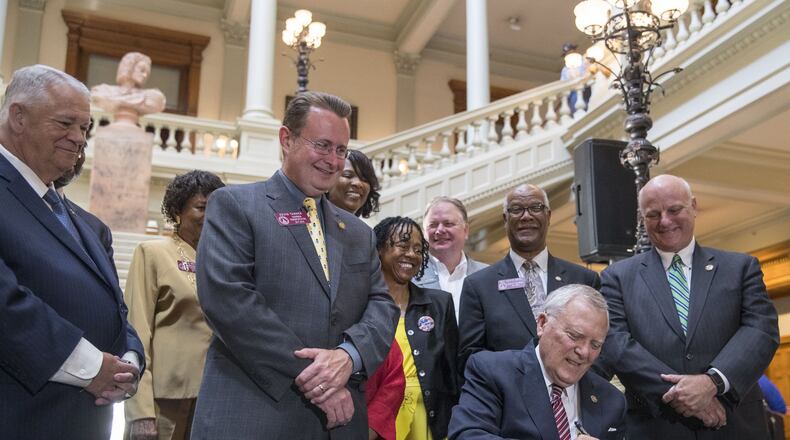For decades speaking the word “transit” could set off arguments and bad blood in much of metro Atlanta.
But on Thursday it prompted a round of “thank yous” and handshakes as Gov. Nathan Deal signed legislation that could pave the way for the region’s biggest expansion of mass transit in a generation.
The governor hailed House Bill 930 as a milestone that will help the region address its traffic problems and prepare for another 2.5 million new residents expected in coming decades.
“They are coming to Georgia, and we might as well get ready for them,” Deal said.
The law creates a new board to coordinate transit funding and construction across the region. It also allows 13 metro Atlanta counties to raise sales taxes to pay for transit expansions, if their voters approve: Cherokee, Clayton, Coweta, Cobb, DeKalb, Douglas, Fayette, Forsyth, Fulton, Gwinnett, Henry, Paulding and Rockdale.
The sales taxes could raise billions of dollars for new transit lines in coming decades. Throw in $100 million included in next year's state budget and transit projects could get a big boost in funding.
It's a remarkable turnaround for a region that at times has been hostile to mass transit. MARTA provides passenger rail or bus service in Fulton, DeKalb and Clayton counties. But voters in Cobb and Gwinnett have said "no" to joining the agency, though they have created their own bus systems.
With traffic congestion a persistent problem, attitudes have changed in many suburban communities. Now Gwinnett and Fulton counties are preparing for transit expansions.
“We’re at the point where we’ve got to look at different ways of traveling,” Gwinnett County Commission Chairwoman Charlotte Nash said.
The bill allows most counties to impose a transit sales tax of up to 1 percent for 30 years.
It allows a referendum on joining MARTA in Gwinnett County this year. It would allow Cobb County to create a special district to collect taxes for transit – the tax would not be collected in parts of the county that don't want mass transit.
And it allows Fulton voters outside Atlanta to approve a .2-percent transit tax – the county already levies a 1 percent tax for MARTA.
HB 930 does not require any county to expand their transit systems. Most counties contacted by The Atlanta Journal-Constitution don’t plan to take advantage of the new law any time soon.
“I would be surprised if there’s any desire from this board to go forward with an election,” said Fayette County Commission Chairman Eric Maxwell.
But Gwinnett and Fulton counties could hold referendums in the next year or two. And Cobb and DeKalb counties may not be far behind.
The transit legislation follows the General Assembly's 2015 decision to raise nearly a billion dollars a year in gas taxes for road and bridge improvements. Taken together, Deal said the actions Georgia's commitment to improving its transportation network.
“We are, indeed, a twenty-first century state,” Deal said. “It’s about time we had a twenty-first century transit system.”
About the Author
Keep Reading
The Latest
Featured


